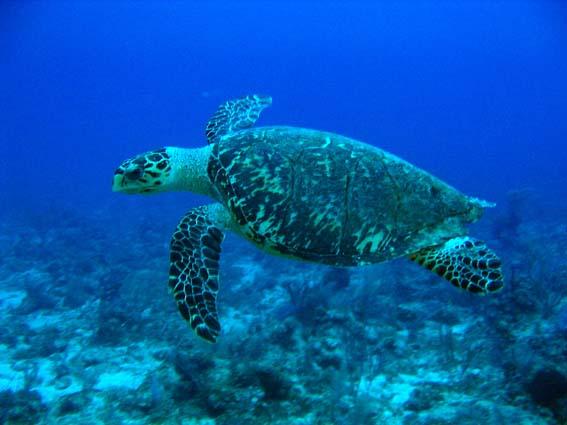High demand for sea turtles in China sends poachers toward Philippines
The critically endangered hawksbill sea turtle has become a favorite target of Chinese poachers in recent months and years. (Photo by Hoffryan via Wikimedia Commons.)
China has a taste for turtle; turtle soup, turtle eggs, turtle bone ground up for use in Chinese medicine to promote longevity — for people, not for the turtles.
But as Chinese waters are increasingly depleted of sea turtles, Chinese poachers are traveling farther to find them. That includes hunting in waters that both China and the Philippines claim, like the waters around the Philippine island of Palawan.
The area is home to the endangered hawksbill sea turtle, a species so ancient it predates some dinosaurs. It can grow to be as large as one meter across, said Glenda Cadigal, of the Palawan Council on Sustainable Development.
“It lays 1,000 eggs,” she said, “and when it lays the eggs in one area, all the hatchlings that hatch from that area will go back to the same spot to lay its eggs at the time it is mature.”
But fewer turtles are making the journey of late, she said. She estimates that their population around Palawan is down about 20 percent from a decade ago, because of poaching, mostly by Chinese.
“They are poached not just for meat, but also for the value of their turtle shell, which is used for almost anything — for accessories, for guitar picks, bags, you name it and they will do it.” Cadigal said.
For some Chinese families, it’s a status symbol to have a stuffed marine turtle on display in their homes. Cadigal said that some Chinese boats caught near Palawan had tools onboard for stuffing turtles.
The Philippine navy, which patrols those waters, captured a Chinese boat of poachers in December. The boat had two big outboard motors, according to Giovanni Bacordo, deputy commander of the Philippine Armed Forces, Naval Forces West. He said it tried to ram the patrol boat, and then fled.
“So we gave chase for about 19 minutes until their outboard motors bogged down,” Bacordo said. “While we were giving chase, they were throwing away some equipment overboard, and maybe some dead sea turtles, we don’t know. But the following day, we recovered a fishing net, weighing about a ton, and three more dead sea turtles. So all in all, we recovered nine dead sea turtles, and three live ones.”
Six Chinese were arrested. The alleged poachers said they came from China’s Hainan province, more than 600 miles away. There’s a thriving black market there in sea turtles — a single sea turtle can sell for $3,000.
Chinese police in Hainan do periodically crack down on turtle poaching. Still, General Juancho Sabban, who heads the Philippine Armed Forces Western Command, suggested Chinese poachers aren’t operating entirely on their own. He thinks they must have a mother ship, perhaps a commercial boat — or perhaps not. He said some Chinese poachers have befriended Palawan locals, and have even offered to buy sea turtles from them, which makes him suspicious.
“By doing so, they are able to step on Philippine soil, befriending the populace, which to us in the military is a very common ploy in a more advanced planning. You have to immerse and know the local culture, as well as mingle with them and establish a support base,” Sabban said.
So far, there’s no proven link between the poachers and the Chinese military. But other Chinese fishing boats have been known to lay down markers in contested waters near here.
As for the accused poachers, the six caught in December await trial. China’s Foreign Ministry spokesman has said China is watching, and wants the Philippines to treat them fairly. Glenda Cadigal of the Palawan Council for Sustainable Development said, if anything, Chinese poachers in the past have been treated too fairly. They’ve been allowed to post bail and leave — or the Chinese embassy posts bail for them.
“I’m not into the bailing, because the lives of these wildlife species — you just pay a certain amount, and then you’re free? For me, it’s not fair,” Cadigal said. “They don’t have their voices, and we should be the ones protecting them.”
There’s now a group in Hainan called “SeaTurtles 911,” which is trying to rescue captured sea turtles, and spread awareness in China that hunting endangered turtles is bad for the environment.
But demand lingers, and the supply near Palawan seems too tempting for poachers to resist. Especially as the Chinese government insists these waters are rightfully China’s to exploit.
Our coverage reaches millions each week, but only a small fraction of listeners contribute to sustain our program. We still need 224 more people to donate $100 or $10/monthly to unlock our $67,000 match. Will you help us get there today?
